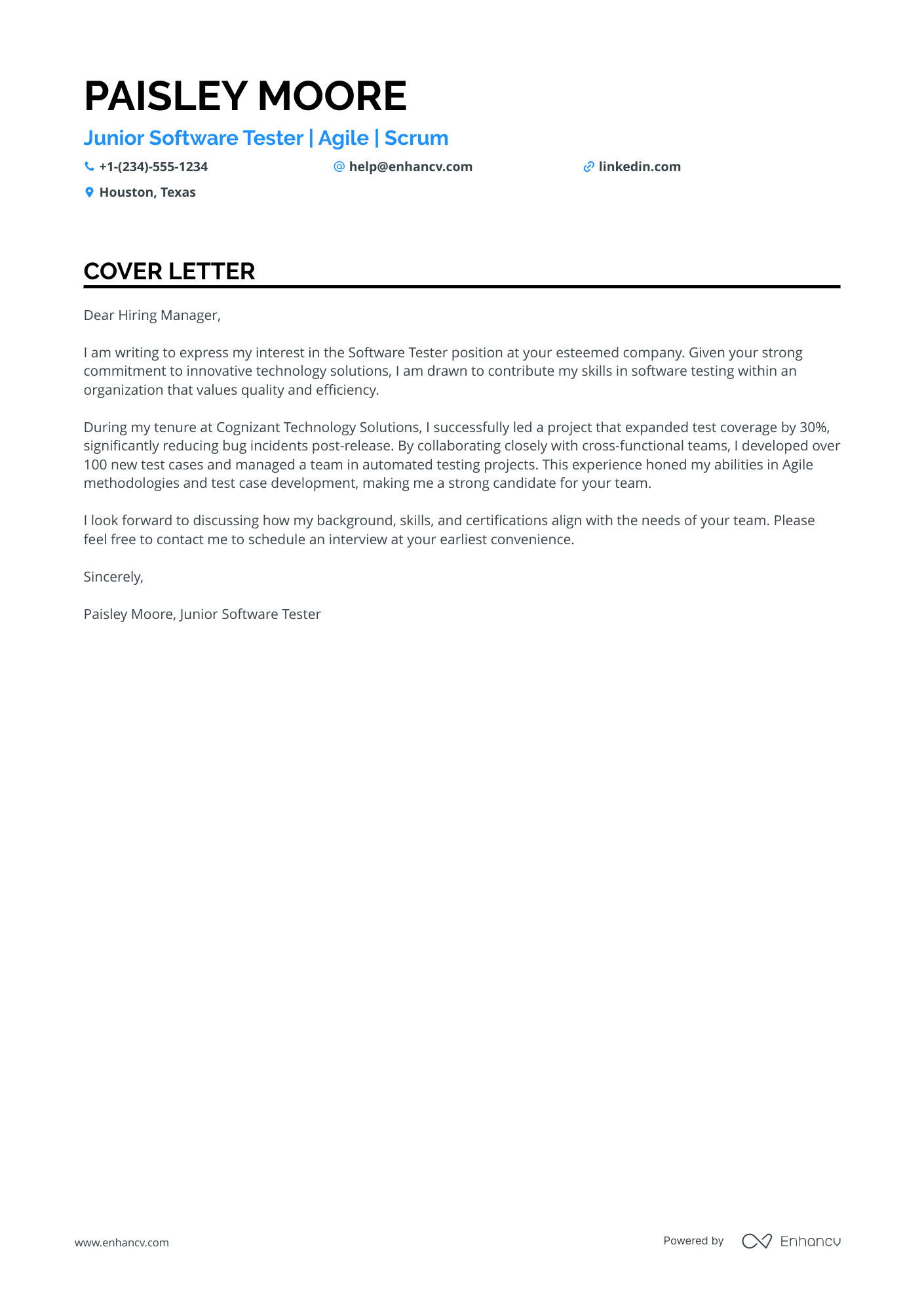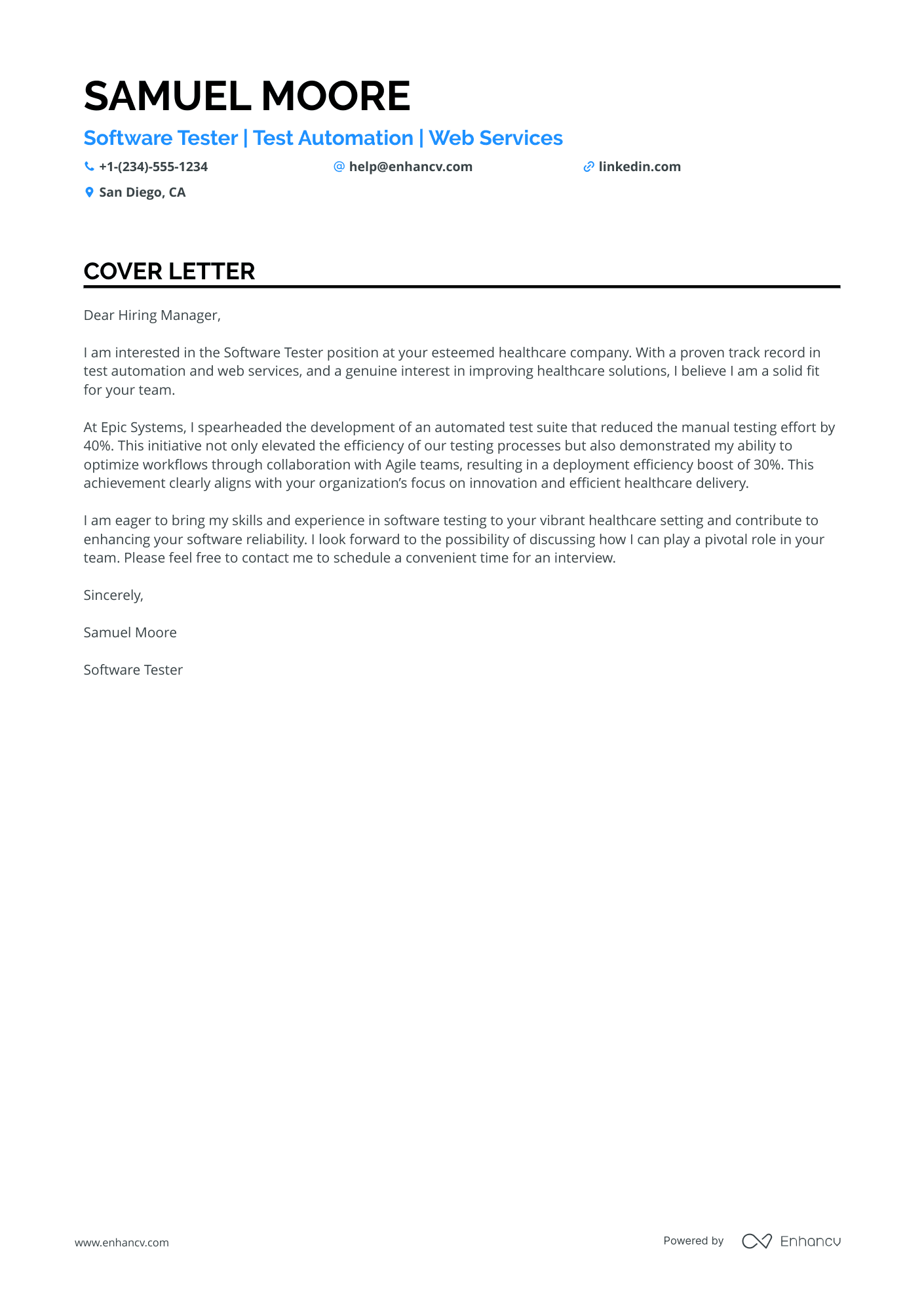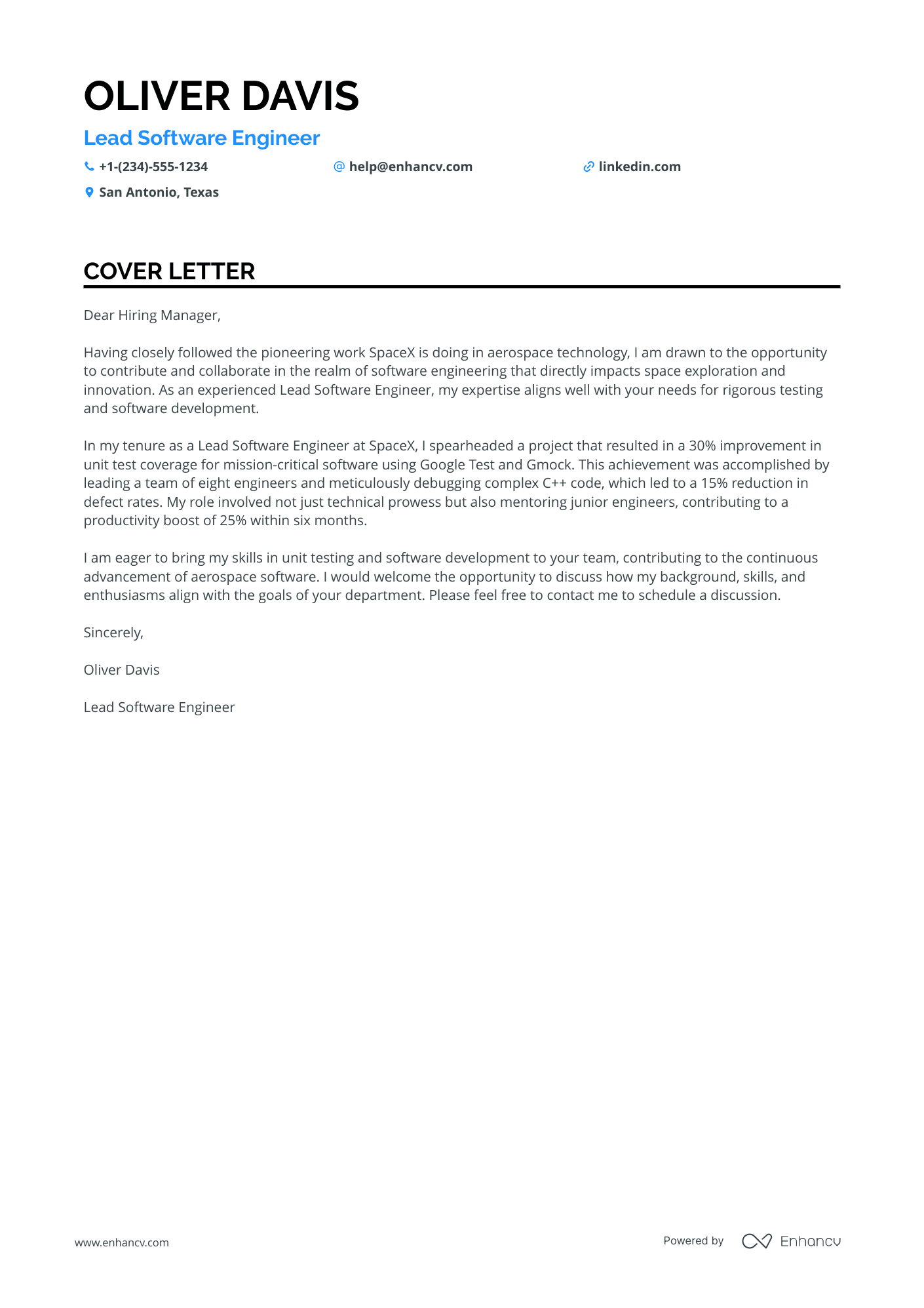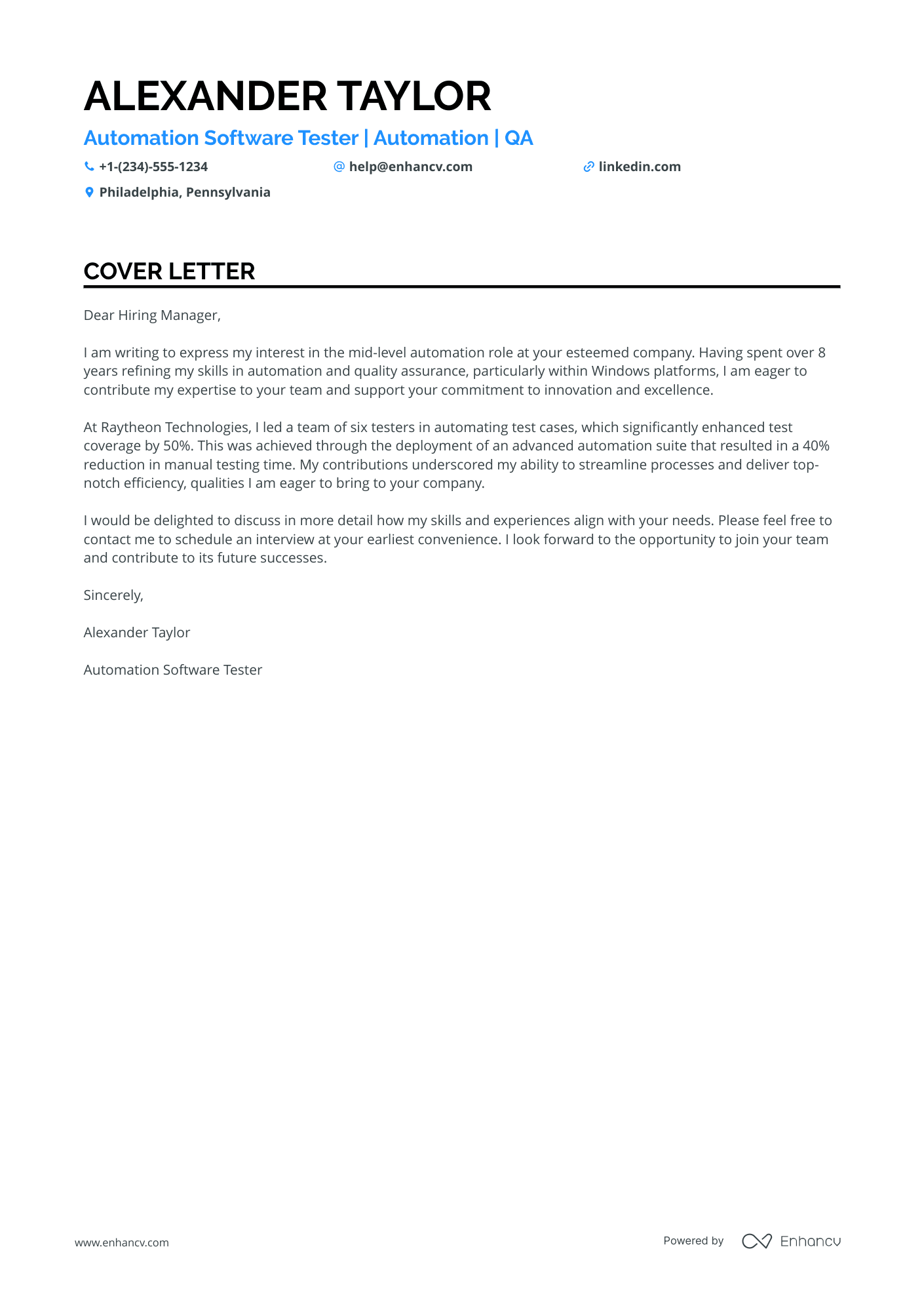Embarking on the journey to land your dream software testing role, you're likely to hit a common roadblock: the dreaded cover letter. Unlike your resume, this isn't the place to list all your achievements. Instead, think of your cover letter as a spotlight, highlighting your proudest professional moment through a compelling narrative. Stick to a page, resist the lure of clichés, and maintain a formal tone. Let's dive into crafting a cover letter that captivates, without simply echoing your resume.
- Write a software tester cover letter that helps you stand out (and get the job);
- Understand how to start and end your software tester cover letter with the appropriate greeting;
- What to include in the body of your software tester cover letter to put your best foot forward;
- Your most important achievements - how to present them as part of your software tester cover letter.
And if you want to make your life even easier, simply drag and drop your software tester resume into Enhancv's AI cover letter generator, and it will write your cover letter for you in just a few moments.
If the software tester isn't exactly the one you're looking for we have a plethora of cover letter examples for jobs like this one:
- Software Tester resume guide and example
- Salesforce cover letter example
- F5 Network Engineer cover letter example
- Spotify cover letter example
- Application Security Engineer cover letter example
- Javascript Developer cover letter example
- Data Center Network Engineer cover letter example
- Computer Support Specialist cover letter example
- Network Administrator cover letter example
- Cisco Network Engineer cover letter example
- Entry Level System Administrator cover letter example
Drop your resume here or choose a file.
PDF & DOCX only. Max 2MB file size.
Software tester cover letter example
ANTHONY HARRIS
Philadelphia, Pennsylvania
+1-(234)-555-1234
help@enhancv.com
- Personalizing the introduction by referencing the company's growth and successes can help align the applicant's goals with the company's trajectory, showing a fit both professionally and culturally.
- Quantifying achievements, such as reducing manual efforts by 45% and increasing on-time delivery metrics by 30%, provides concrete evidence of the applicant's impact and capability to improve processes.
- Highlighting the implementation of a Selenium-based automated testing framework demonstrates the applicant's up-to-date technical skills and innovation in the field of QA, aligning with industry standards.
- Expressing genuine admiration for the company's commitment to innovation and quality not only shows thorough research but also positions the applicant as someone with shared values, thereby potentially strengthening cultural fit.
What about your software tester cover letter format: organizing and structuring your information
Here is one secret you should know about your software tester cover letter assessment. The Applicant Tracker System (or ATS) won't analyze your cover letter.
You should thus focus on making an excellent impression on recruiters by writing consistent:
- Header
- Greeting
- Introduction
- Body paragraphs (and explanation)
- Promise or Call to action
- Signature (that's optional)
Now, let's talk about the design of your software tester cover letter.
Ensure all of your paragraphs are single-spaced and have a one-inch margins on all sides (like in our cover letter templates).
Also, our cover letter builder automatically takes care of the format and comes along with some of the most popular (and modern) fonts like Volkhov, Chivo, and Bitter.
Speaking of fonts, professionals advise you to keep your software tester cover letter and resume in the same typography and avoid the over-used Arial or Times New Roman.
When wondering whether you should submit your software tester cover letter in Doc or PDF, select the second, as PDF keeps all of your information and design consistent.
Struggling to find time to write a cover letter? Try our free cover letter generator to create one in just seconds, straight from your resume.
The top sections on a software tester cover letter
- Header: Includes your contact information and the date, providing a professional look and making it easy for the recruiter to reach out to you.
- Greeting: Addresses the hiring manager specifically, showing that you did your research and are genuinely interested in the position at their company.
- Introduction: Briefly introduces yourself and states the position you are applying for, immediately clarifying the purpose of your cover letter and your interest in software testing.
- Body (including Relevant Experience and Technical Expertise): Highlights your previous testing experience, familiarity with testing tools, and understanding of software development lifecycle, which are crucial for the software tester role.
- Closing: Wraps up your cover letter by reiterating your interest in the position, inviting the recruiter to review your attached resume, and indicating your availability for an interview, all of which prompt a call to action.
Key qualities recruiters search for in a candidate’s cover letter
Attention to Detail: Ability to meticulously analyze applications for bugs and inconsistencies, an essential trait to ensure software quality and reliability.
Technical Proficiency: Profound knowledge of testing tools, coding languages, and databases to effectively test software and understand the technical nuances that need to be addressed.
Analytical Skills: Strong capability to analyze test results, draw conclusions from data, and create logical test cases to track down and solve complex software defects.
Problem-Solving Ability: The talent to troubleshoot, think creatively and outside the box to solve problems and find bugs that are not immediately obvious.
Communication Skills: Excellent written and verbal communication to accurately document bug reports, explain complex information to non-technical stakeholders, and collaborate effectively with development teams.
Adaptability and Learning Agility: Willingness and ability to quickly learn new tools and technologies, adapt to changing software and industry trends, and continuously improve testing practices and methodologies.
Kick off your software tester cover letter: the salutation or greeting
When writing your software tester cover letter, remember that you're not writing for some complex AI or robot, but for actual human beings.
And recruiters, while on the lookout to understand your experience, would enjoy seeing a cover letter that is tailored to the role and addresses them. Personally.
So, if you haven't done so, invest some time in finding out who's the hiring manager for the role you're applying to. A good place to start would be LinkedIn and the corporate website.
Alternatively, you could also get in touch with the company to find out more information about the role and the name of the recruiter.
If you haven't met the hiring manager, yet, your software tester cover letter salutation should be on a last-name basis (e.g. "Dear Mr. Donaldson" or "Dear Ms. Estephan").
A good old, "Dear HR Professional" (or something along those lines) could work as your last resort if you're struggling to find out the recruiter's name.
List of salutations you can use
- Dear Hiring Manager,
- Dear [Company Name] Recruiter,
- Dear [Mr./Ms. Last Name],
- Dear [Team/Department Name] Hiring Team,
- Dear [Job Title] Search Committee,
- Dear [Job Title] Hiring Leader,
Get creative with your software tester cover letter introduction
Recruiters are going to assess plenty of candidate profiles for the role. Thus, anything you do to stand out will win you brownie points.
Use your software tester cover letter introduction to share something memorable about your experience.
But before you go down the rabbit hole of creativity and humor, align your message with the company culture.
For example, if you are applying for a role in some startup, use those first two sentences to tell a funny story (about your experience) to quickly connect with the recruiter.
That one achievement in your software tester cover letter body
The lengthiest part of your software tester cover letter is the body.
Within the next three to six middle paragraphs, present yourself as the best candidate for the role.
How can you do that without retelling your whole professional resume?
Select one key achievement that covers job-crucial skills and technologies (and is memorable).
Within the body of your software tester cover letter, aim to tell the story of how you achieved your success. Also, write about how this would help out your potential team.
A sincere and original way to end your software tester cover letter
When writing their software tester cover letter, candidates tend to use one of these phrases, "Sincerely yours" or "I look forward to hearing from you".
Both statements show good manners, but your cover letter should end in a more actionable manner.
Write about:
- how you see yourself growing in the role/organization;
- the benefits you would bring about (you'd impress even more with tangible metrics);
- the next steps in the process (provide your availability for interviews).
Software tester cover letter advice for candidates with no experience
If you're worried about writing your Software Tester cover letter and have no professional experience, we sure have some advice for you.
Turn recruiters' attention to your transferable or relevant skills gained thanks to your life and work experience.
Instead of writing about past jobs, focus on one achievement (whether from your volunteering experience, education, etc.) and the skills it has helped you build.
Alternatively, you could focus your Software Tester cover letter on your career objectives and goals. Always remember to make those relevant to the job you're applying for by detailing how you see yourself growing as part of the company.
Recruiters would be way more impressed with candidates who fit the job profile and can bring about plenty of skills and vision to the table.
Key takeaways
Your software tester cover letter is your best shot at standing out by showing your motivation and the unique skills you'd bring to the job:
- Chose no more than one achievement, which you'd be talking about in the body of your software tester cover letter, by focusing on skills and outcomes;
- Address recruiters with their first or last name, or "Dear Hiring Manager" in your software tester cover letter greeting;
- Introduce in no more than two sentences what makes your profile unique (perhaps it's your motivation, enthusiasm, or appreciation of the company you're applying for);
- Select the same font you have used in your resume (avoid Times New Roman and Arial, as most candidates tend to invest in them);
- Close your software tester cover letter with a promise of how you see yourself growing in the company and the benefits you'd bring about.
Software Tester cover letter examples
By Experience
Junior Software Tester
- Highlighting specific achievements: The cover letter emphasizes a significant accomplishment, such as expanding test coverage by 30% and reducing bug incidents, showcasing the applicant's past success and impact.
- Relevant experiences: Mentioning work with Agile methodologies and automated testing demonstrates the candidate's proficiency in industry-standard processes and tools vital for a Software Tester role.
- Team collaboration: The letter illustrates the ability to work closely with cross-functional teams, an essential skill in software testing, where coordination with developers and stakeholders is crucial.
- Expressing alignment with the company's goals: The applicant expresses a strong interest in joining the company due to its commitment to innovative technology, aligning personal goals with the company's vision.
Senior Software Tester
- Emphasize relevant experience: The cover letter highlights specific achievements in a previous role, such as developing an automated test suite that reduced manual testing effort by 40%. This demonstrates the candidate's ability to effectively contribute to the company's goals.
- Show alignment with company priorities: The candidate mentions their ability to improve deployment efficiency and optimize workflows, aligning with the company's focus on innovation and efficient healthcare delivery.
- Mention of teamwork and collaboration: Highlighting collaboration with Agile teams shows that the candidate can work effectively in team environments, a key skill for software testers who must interact with various stakeholders during the development process.
- Express eagerness and commitment: The applicant conveys a genuine interest in the role and a strong desire to contribute to the company’s success, demonstrating enthusiasm and readiness to engage with the organization.
Lead Software Tester
- Alignment with Company's Mission: The cover letter emphasizes the applicant's passion for and alignment with SpaceX's pioneering work in aerospace technology, which is crucial for roles in companies driven by innovation and exploration.
- Relevant Experience and Achievements: The letter highlights a specific achievement of improving unit test coverage by 30%, showcasing relevant experience and quantifiable success in software engineering tasks crucial for aerospace projects.
- Leadership and Mentoring: Mentioning the applicant's role in leading a team and mentoring junior engineers speaks to leadership qualities and the ability to enhance team productivity, important attributes for a lead position.
- Invitation for Further Discussion: Concluding with an invitation to discuss further shows enthusiasm and eagerness to explore the opportunity, a professional approach in initiating dialogue.
By Role
Automation Software Tester
- Emphasize related skills and experiences, such as expertise in automation and quality assurance, that directly align with the role you're applying for.
- Highlight specific achievements and contributions, such as leading a team to enhance test coverage and reduce manual testing time, to demonstrate impact and value.
- Express eagerness to contribute and how your experiences will support the potential employer's goals, reinforcing alignment with the company's values and mission.












